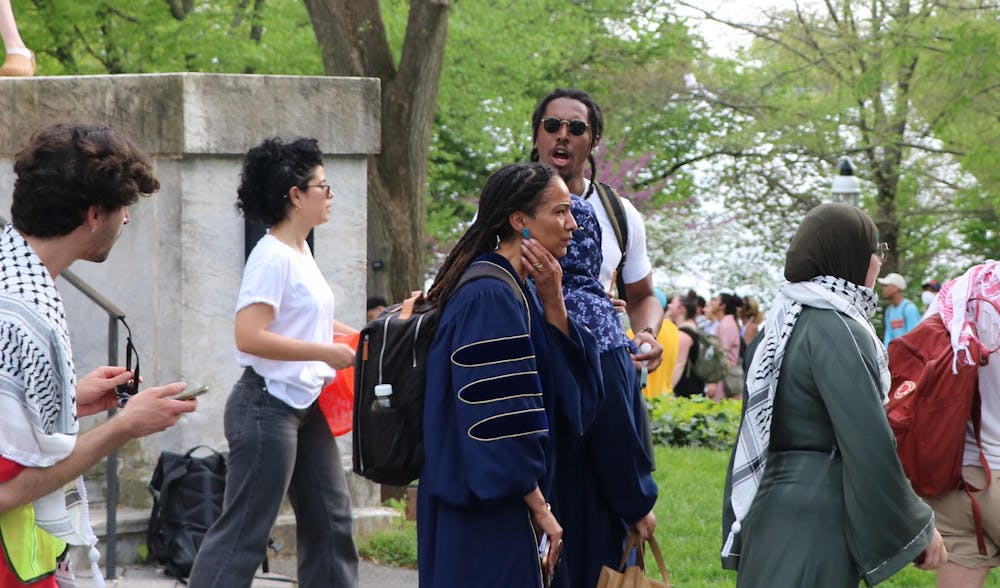African American Studies professor Ruha Benjamin has been awarded a MacArthur “genius grant,” the University announced on Tuesday, Oct. 1. Later that day, Benjamin shared on X an exchange with University communications revealing that the University had opened an investigation into her support of pro-Palestine protesters.
In preparation for the MacArthur announcement, Benjamin answered a number of questions from University communications staff in emails she shared with The Daily Princetonian. When they asked about her reaction to the news, Benjamin wrote that she found out she’d been awarded the fellowship “the morning after a tense call with Princeton [U]niversity officials investigating my support of students protesting the genocide in Gaza.”
Benjamin has been a fixture of pro-Palestine activism at Princeton. She revealed to the ‘Prince’ on Tuesday that the University interviewed her on Aug. 27 as part of an investigation into her role during the Clio Hall occupation in April.
Her response to communications staff continued, “What would have been a moment of pure joy and excitement was tempered by the sense that the same institutions that are quick to celebrate our accomplishments have been slow to respond to students’ demands to disclose and divest from genocidal violence.”
Benjamin included a note alongside her responses, which read, “I understand that my response to the first question puts you in a tricky position. However, I do not want to lose the context in which I experienced the call, so if for any reason you are unable to include my account, I would ask that no quotes from me be used in the article.”
In line with this request, communications staff chose to not include her testimony. Benjamin ultimately shared her responses in full on X.
“In the end, I wasn’t surprised that the Office of Communications chose not to include my responses to their questions, because the homepage isn’t journalism. It’s PR for the [U]niversity,” Benjamin wrote in a statement to the ‘Prince.’
University communications declined to comment to the ‘Prince.’
“We’ve heard so much about free expression since the school year began,” she added. “[Y]et it seems the [U]niversity draws the line when that expression casts the institution in an unfavorable light (as did my responses) or creates any disruption to business as usual.”
The MacArthur Fellowship, which is awarded to 22 scholars, writers, and artists each year, comes with an $800,000 award disbursed over a five-year period. The foundation wrote that, “By integrating critical analysis of innovation with attentiveness to the potential for positive change, Benjamin demonstrates the importance of imagination and grassroots activism in shaping social policies and cultural practices.”
Benjamin’s work focuses primarily on the intersection of technology and race. She’s been awarded for both her writing and her teaching, having received the President’s Award for Distinguished Teaching at Princeton in 2017.
In the University’s announcement on Tuesday, President Christopher Eisgruber ’83 said, “Professor Benjamin is a strikingly original and creative thinker, writer, and educator who inspires her students and readers.”

In her statement to University communications, Benjamin shared details about her current pursuits while on sabbatical, which include a virtual reality project called “Phoenix of Gaza” and a collaborative multimedia work “about the relationship between friendship and freedom dreaming.” She also noted her work on her next book, which will examine Black and Indigenous knowledge alongside the ecological costs of innovation.
While she continues her research, Benjamin remains in the dark about the University’s investigation into her conduct. She wrote to the ‘Prince’ that she has not received any updates since she was interviewed by investigators on Aug. 27.
Benjamin and three other faculty members entered the building during the occupation on April 29, leaving prior to the 13 arrests later that day. She later released a statement chronicling what she observed at the protest, noting that she and the other professors were present in a faculty observer capacity.
Those 13 arrestees, which included undergraduates, graduate students, a postdoc, and a Princeton Theological Seminary student, appeared in court Tuesday — the same day as the MacArthur grant announcement. Five of the 13 were students in the African American Studies department.
Benjamin’s support for student protesters remains steadfast. In her statement to University communications, Benjamin wrote, “I plan to ‘celebrate’ the award by showing up to court.”
Annie Rupertus is a head News editor for the ‘Prince’ from Philadelphia, Pa. who often covers activism and campus governance.
Please send any corrections to corrections[at]dailyprincetonian.com.








